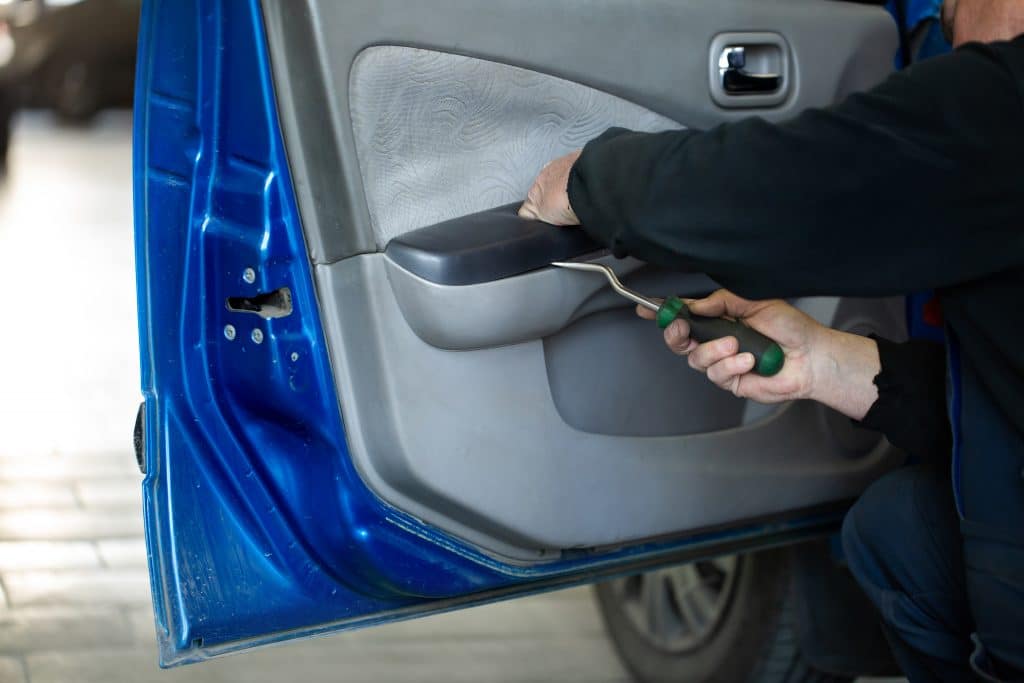Car doors should work smoothly, yet many of us overlook early warning signs until a lock completely fails. When we catch problems early, we avoid breakdowns, stressful lockouts, and costly repairs. At Super G&R – Automotive Locksmith, we understand how frustrating small lock issues can become if ignored. Let’s go through the most common signals of car door lock failure and what steps we can take to deal with them before they turn into emergencies.
Difficulty Turning the Key
Sometimes a key that once turned easily begins to feel stiff or requires extra pressure. This issue can point to wear inside the lock cylinder or even dirt buildup that interferes with the mechanism. Our team has seen many cases where drivers ignored this early change and ended up breaking a key inside the lock. When the lock feels rough, it is best to lubricate it with a proper lock-safe spray and test again. If it continues to stick, reaching out to an automotive locksmith can prevent bigger problems.
Remote Key Fob Struggles
Modern cars rely heavily on remote key fobs, but the signals do not always work reliably. If we notice that doors respond only sometimes or require us to stand closer to the vehicle, it could be more than just a weak battery. Sensors in the door or wiring issues might be failing slowly. Ignoring this can leave us locked out one day without warning. Replacing batteries is always the first step, but when problems remain, we should test both spare and primary fobs to confirm if the issue lies in the lock system itself.
Unusual Sounds While Locking
Locks usually engage with a quiet click or motor sound. When grinding, buzzing, or loud clicks replace the usual noise, something mechanical is wearing down. Over time, small parts inside the actuator may loosen or break. We often advise listening carefully during daily use since sounds often change before the lock completely fails. These noises can be an early call for inspection. Taking action early allows us to fix only the failing part instead of replacing the whole assembly later.
Key Not Entering Smoothly
Keys should slide into locks without resistance. If a key begins to stick halfway, the cause may be misaligned tumblers, dirt, or even internal damage from wear. Trying to force the key can bend it, leaving us with a worse problem. We recommend trying a different key copy to see if the fit improves. When all copies feel rough, the lock cylinder is likely at fault. Cleaning the slot with compressed air sometimes helps, but professional servicing is often the safer long-term choice.
Doors Failing to Lock Fully
At times, the lock mechanism may give the impression that the car is secure when it is not. A partially engaged latch or a lock that pops back up can leave vehicles exposed to theft. We should always double check by pulling the handle gently after locking to confirm the latch is set. If a lock repeatedly fails to stay down, it often points to worn actuators or linkage issues. Handling this quickly avoids the risk of leaving our vehicle vulnerable while parked.
Frozen or Stiff Locks in Cold Weather
Cold climates bring unique challenges to car locks. Moisture can seep inside and freeze, leaving us unable to unlock doors on frosty mornings. While this may appear seasonal, repeated freezing weakens internal parts over time. Using a proper lock de-icer rather than hot water is important, since sudden temperature changes can crack components. If locks freeze often, it may be a sign of worn seals that allow water inside. Replacing those seals is a small step that prevents recurring winter troubles.
Power Lock Button Malfunctions
Inside switches should consistently trigger all doors. When only some respond or there is a delay, the wiring or actuators may be wearing out. These faults usually start as minor inconveniences but grow into full lock failures. Testing all doors from each switch position helps us pinpoint which side may be starting to fail. Our team often finds that early intervention with wiring inspections saves car owners from being stranded later when power locks suddenly stop responding.
Intermittent Lockouts
Another overlooked signal is occasional lockouts where the key or remote does not work at random. Many people assume this is a simple glitch, but in reality, it usually signals weakening actuators or internal electronics beginning to fail. When this starts, it rarely improves on its own. Recording when and how often the issue happens helps professionals diagnose the root cause quickly. It also prevents the stress of being fully locked out at the most inconvenient times.
Damage Around the Lock
Physical signs such as scratches, loose handles, or slightly bent key slots can indicate both wear and possible tampering. Even if the car still locks and unlocks, these visible changes should not be ignored. Weakness around the lock makes it easier for a complete failure to happen. If we see damage around the keyhole or handle, scheduling a repair ensures we do not face sudden lock breakage.
When to Seek Help
Recognizing these early warnings is one part of prevention, but taking timely action is the other. Trying temporary fixes may help in the moment, but without proper repair, the problems usually return. At times, only professional servicing can restore reliability. If we suspect that our lock is on its way to failure, reaching out for car door lock repair support is the safest step. This ensures we avoid emergencies and keep our vehicle secure.
Frequently Asked Questions
How do I know if my car lock is just dirty or actually failing?
If cleaning with compressed air or a lock-safe lubricant does not improve the problem, it usually points to actual wear inside the mechanism rather than simple dirt.
Can a weak car battery cause door lock issues?
Yes, low battery power often reduces the strength of electronic locks and fobs. Checking the battery should always be part of the troubleshooting process.
Why does my key only work in some doors and not others?
That usually happens when different locks have worn unevenly. Some may still match the key well, while others may require servicing or replacement.
Is it safe to keep using a lock that makes grinding noises?
No, grinding indicates parts are wearing down. Continued use can cause a complete breakdown or even trap the key inside.
What should I do if my car lock freezes often in winter?
Use a proper de-icer product and avoid hot water. If freezing continues, have the seals inspected since water may be leaking inside the lock assembly.

